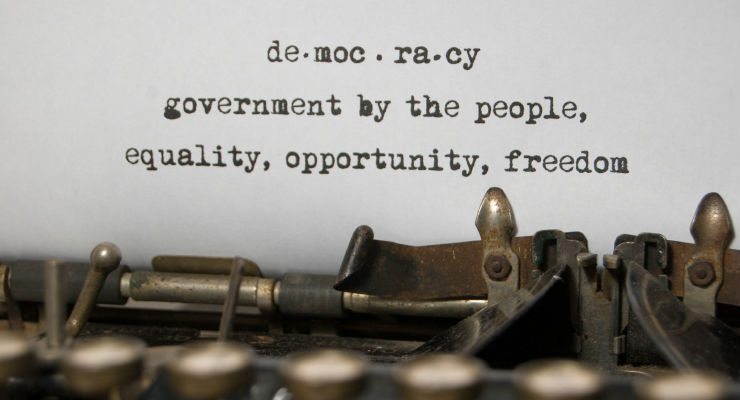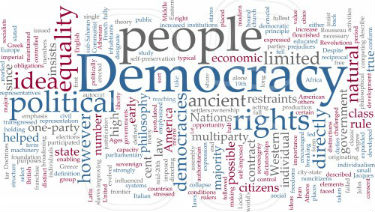
Dictatorships are engaged in a massive propaganda effort to win the international battle over democracy’s definition. The following commentary was written by Arch Puddington, the Vice President for Research at Freedom House under the title, “Redefining Democracy to Undermine Democracy“:
It is a testament to the power of the democratic idea that authoritarian leaders around the globe claim the mantle of democracy for forms of government that amount to legalized repression. Even as they heap disdain on the liberal order that prevails in the United States and Europe, Vladimir Putin, the Chinese Communist leadership, and various aspiring leaders-for-life insist on the validity of their own systems as types of democratic rule. They even devise special phrases, usually consisting of the word “democracy” preceded by a modifier to describe their supposed variant: “sovereign democracy,” “revolutionary democracy,” “illiberal democracy.”
The most outrageous attempt to appropriate the “d” word to add a patina of legitimacy to an antidemocratic system was the phrase “people’s democracy.” This label was attached to the East European satellite states where communism was imposed by the Red Army after World War II. Given the unambiguously totalitarian nature of the political order in these countries, the term soon fell into disrepute.
During the 1950s, another variant emerged: “guided democracy.” Sukarno, Indonesia’s postcolonial leader, coined the phrase to describe a system based on the prevalent decision-making method in his country’s villages, which ostensibly entailed public consensus but granted wide-ranging powers to the village elder. Since Sukarno regarded himself as a kind of village elder for all of Indonesia, guided democracy suited him well. The concept mostly died out after Sukarno lost power in the mid-1960s, though the phrase (sometimes rendered as “managed democracy”) is occasionally dusted off to describe quasi-authoritarian arrangements like that in Singapore.
These tortured efforts to exploit “democracy” to dress up antidemocratic projects faded during the political changes of the last quarter of the 20 century. In recent years, however, the democratic idea has come under increased pressure from a more aggressive collection of authoritarians and would-be strongmen. Some have imposed systems that reject democratic standards almost in their entirety, with bogus elections, state-dominated media, the repression of civil society, rampant corruption, and a thoroughly politicized judiciary. But even as they abolish the institutions of democracy, the new authoritarians still cling to the word itself, while adding a modifier or qualification that is invariably justified as reflecting “the unique history and culture of our people.”
Here are three of the more prominent contemporary democracy modifiers:
Sovereign Democracy: The phrase was coined in 2006 by Vladislav Surkov, a spin doctor for Vladimir Putin, in an effort to give Russia’s evolving nondemocratic system a thread of legitimacy. The term seems designed to exempt the country from international norms and attach some sort of national pride to a structure that guaranteed the Kremlin’s dominance of politics, the media, and the judiciary. Surkov stage-managed a superficial display of elections and political pluralism, but few were fooled. As one critic put it, the system degenerated into “a political contraption based on imitation, cynicism, slanderous propaganda, and outright electoral fraud … driven by fake parties and ghost nongovernmental organizations dependent on government money.”
Since Putin returned to the presidency in 2012 and invaded Ukraine in 2014, the regime has grown more openly hostile to democratic institutions, and the concept of sovereign democracy is seldom mentioned. Instead, Putin and his entourage speak of their commitment to “traditional values,” a phrase meant to distinguish Russia from a Europe that is said to be in economic and cultural decline.
Revolutionary Democracy: This phrase has been adopted to describe the system devised by the Ethiopian People’s Revolutionary Democratic Front (EPRDF), the ruling party long led by the late Ethiopian prime minister, Meles Zenawi. The EPRDF was launched in the 1980s as a Marxist-Leninist resistance group during the civil uprising against the military government of Mengistu Haile Mariam. A coalition of various ethnic-based liberation parties, the EPRDF jettisoned Marxism after the collapse of the Soviet Union.
Nevertheless, the party retains considerable Leninist baggage in its outlook and especially its internal organization. It regards itself as a vanguard party that enjoys superior knowledge of the nature of social development. It stresses class divisions and treats neoliberalism as the principle adversary of Ethiopian development. Under revolutionary democracy, an individual’s contribution to political or cultural life is judged by his or her contribution to development, as defined by the EPRDF. Thus, the party refers to “developmental investors,” “developmental journalists,” and even “developmental artists.” The party is organized along Leninist lines of “democratic centralism,” sponsors active youth and women’s divisions, has co-opted institutions like trade unions and religious denominations, maintains an ambitious indoctrination campaign in universities, and functions as the gatekeeper for positions of responsibility in both the public and private sectors.
Not surprisingly, Ethiopia falls short on practically every indicator of political rights and civil liberties.
• Illiberal Democracy: In a speech delivered this July, Hungarian prime minister Viktor Orbán suggested that liberal democracy is in decline and that Hungary would embark on a different path to national development. He denigrated European achievements and values, asserting that “societies built on the principle … of liberal democracy will probably be unable to maintain their global competitiveness in the upcoming decades.” He went on to say that Hungary would become a “work-based” state, as opposed to the failed models of the liberal welfare state.
Hungary, of course, is still a democracy. Indeed, it qualifies as a liberal democracy despite some recent reversals. Even as Orbán complains about European decline, he insists that Hungary’s futures lies with the European Union. In keeping with a well-established pattern, Orbán’s spokesmen claimed that the July speech had been misinterpreted, especially the use of the word “illiberal.” Yet there was no mistaking which countries Orbán singled out for praise as contemporary success stories: China, Russia, Singapore, Turkey. Two outright dictatorships, and two countries with quasi-authoritarian leaderships.
As the above examples suggest, the attachment of modifiers to the word “democracy” is no more persuasive today than it was in the past. Democracy requires honest elections, an opposition that has a fair opportunity to win power, freedom of expression, an independent judiciary, minority rights, a free rein for civil society. Systems that repress even some of these rights and institutions may be dictatorships or despotisms, authoritarian or quasi-authoritarian. But in no way do they qualify as democracies.
Authoritarians, of course, usually understand that this is the case. Their goal is less to illuminate regime success than to shift attention to the deficiencies of others. In the end, spin doctors and the manipulation of words will not make authoritarianism more appealing. But they will draw strength if democracy is seen as mired in doubt and gridlock. A democratic world that combines self-assurance, a plan to expand prosperity, and a willingness to confront its own weaknesses is the best answer to those who take the name of democracy in vain.

Leave a Reply